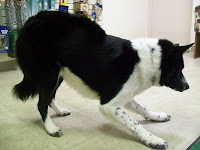Majority of pet owners don't realize the importance of dental care and how it effects the pet's overall health. Periodontal disease is the most commonly diagnosed disease in cats and dogs over three years of age. During February the American Veterinary Medical Association (AVMA) and American Veterinary Dental Association (AVDS) join together to promote dental health and remind owners of the dangers of poor dental health.
Just like people food particles and bacteria can build up leading to plaque and tarter, leading to gingivitis and severe periodontal disease. Periodontal disease can lead to tooth decay, bad breath, bleeding gums, and even tooth lose. If periodontal disease gets worse bacteria from the teeth can travel into the bloodstream and may result damage to the organs. To help prevent such problems the AVDS recommend owners follow the following guidelines:
1. Take your pet to the veterinarian for a dental exam. During your pet's yearly physical your pet should have a dental exam including the gums. Your veterinarian may recommend a dental cleaning if plaque and tartar are present.
2. Start a home dental care routine. Your veterinarian can start you on your pet on a personalized dental care regimen at home. There are supplements available, as well as special diets, treats, tooth paste, and brushes specially designed and flavored for pets.
3. Monitor your pet's oral health by scheduling checkups with your veterinarian. These checkups may include yearly cleanings by your pet's veterinarian.
By following theses easy steps pet owners can help prevent periodontal disease not just in February but all year long. For more information visit www.petdental.com.
From Now on "Like" us on Facebook!
15 years ago



 Ozzie was a true
Ozzie was a true  Maggie proves that girls can catch a snowballs too!
Maggie proves that girls can catch a snowballs too!








